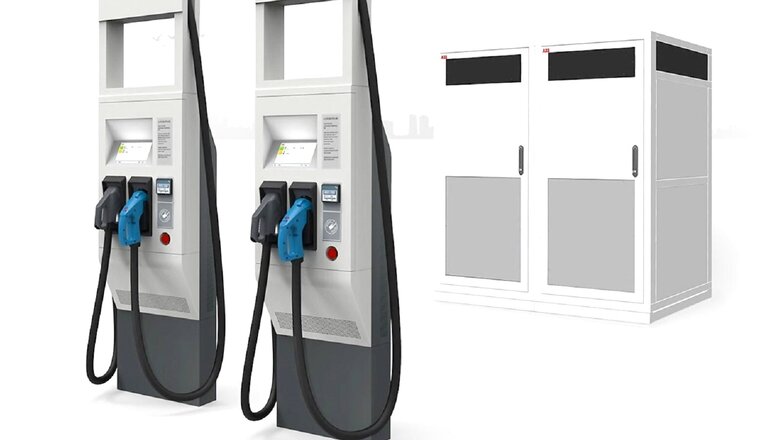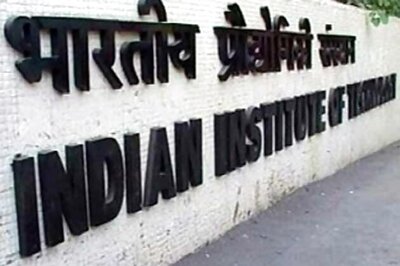
views
Electric Vehicles are fast replacing the regular internal combustion engine vehicles globally. India, however, is lagging behind due to growing range reluctance from such vehicle. While home mounted AC wall chargers are enough for daily office-home-office commuting, long distance travel is still a roadblock in promoting EV sales in India. One way to address the range reluctance or range-anxiety is by offering as many fast-chargers that can be used in times of emergency or for those, who are doing intra-city journey. We got in touch with Kiran Dutt, President, Electrification Business, ABB, one of the leading EV charger maker globally to understand the India’s EV infrastructure and the road ahead.
Q.Tell us about ABB’s EV charging solutions and offerings
With exponential growth of electric vehicles (EV) and the development of electric cars with longer ranges, demand for fast charging stations has increased. ABB has been in the EV charging business since 2010, since electric vehicles were commercially accepted. These are some of the ABB charging solutions and offerings everyone should know about –
1. ABB offers a total EV charging solution from compact, high quality AC wallboxes, reliable DC fast charging stations with robust connectivity, to innovative on-demand electric bus charging systems.
2. ABB offers complete Electric Vehicle Infrastructure solutions for 4 wheelers including passenger cars, fleet vehicles, heavy commercial vehicles including buses and trucks, off-road vehicles including electric boats.
3. Our range includes chargers from 3.7kw Home Charging Solution to 600kw DC Fast Charging solutions. ABB installed the first fast charging solution – ABB Terra 53 fast charging station for electric vehicles – at Niti Aayog’s headquarters in the heart of New Delhi in 2018.
Q.What smart mobility solutions are you offering?
Transportation is a major contributor to CO2 emissions in the world. About 24% of all emissions come from this sector and over 75% of those are from road transportation with cars, trucks, and motorbikes. Passenger cars also account for 60% of the road transportation emissions globally. To offer solutions to these challenges, ABB offers the following –
1. ABB engineers electrification solutions including smart transportation solutions from EV chargers for the home, through electrified fleet depots and opportunity charging for electric bus and trucks, to high-power chargers for the highway stations of the future.
2. In smart mobility solutions, ABB provides digital connectivity solutions including smart monitoring, predictive maintenance, and integrated payment gateways for Charge Point Operators. For Home chargers, ABB provides easy to use/connect, Chargersync application.
3. ABB Ability™ connected chargers enable fast global service and proactive maintenance. ABB has years of experience in creating, installing, and maintaining charging infrastructure, including several nationwide charger networks.
4. ABB India has been collaborating with key industry stakeholders ever since we moved into the space, including government think tanks, innovative start-ups, and electric vehicle OEMs to further encourage the adoption of EVs as well as support creativity and entrepreneurship in the space.
Q.How do you see the overall changing infrastructure in India?
India is significantly picking up pace in setting up the charging infrastructure and it has the potential to be at par with global leaders in the space. Charging infrastructure in India is growing at a good rate with many Charge Point Operators putting up reliable charging points. This is boosting the confidence of EV OEMs to launch their electric cars in India.
The Government is also supporting the EV industry through various schemes and incentives for EV adoption with a key focus on charging infrastructure. Also, the Government has set a target to electrify 70% of all commercial vehicles, 30% of private cars, 40% of buses, and 80% of two-wheeler and three-wheeler sales by 2030.
If we are to achieve this target within the set timeline, the penetration of charging stations across India should increase considerably, as adequate charging infrastructure is a key prerequisite that will define the adoption trends of EVs in India.
Q.What’s your take on state Govt incentives and FAME II policy?
The FAME II Policy is a positive measure as it equips the EV industry in India with more time to extend the benefits of EVs to customers, bringing us closer to achieving the targets set under the scheme. The recent policy updates and measures by both state and central governments has created a positive stir in the market skewing consumer interest towards EVs and it will bring the common man of India, a step closer to EVs.
The Government is providing incentives to EV owners and this would propel the sales of EVs in India and FAME II policy has been successful not only in the domain of Public Charging but also in pushing EVs in public transport.
The combined effort of private and public sector setting up charging stations will benefit the end user. Also, the increased focus on interlinking renewable energy sources with charging infrastructure will ensure a strong foothold in clean mobility.
Q. What are some of the upcoming EV tech innovations?
India has been taking strong steps towards increased EV adoption. By making the shift towards electric vehicles (EVs), India will be able to utilize its abundant sources of renewable energy and availability of highly skilled manpower in the technology and manufacturing sectors.
With most of the auto players pledging to produce more EVs in future, EV tech and innovation certainly be at the helm. We would see more innovation in battery technologies, and drive adoption of faster-charging solutions.
From technologies that fosters wireless charging for stationary EVs to Managed Charging, and Vehicle-To-Grid Charging, India has the potential to revolutionize the EV industry.
Q.What’s the next big change do you see in the auto industry?
Electric vehicles would be a key player to help achieve a carbon-neutral world with zero carbon emission. Global automakers have been working towards achieving this goal since decades. In line with the same, the next big change shall be EVs overtaking ICE vehicles in numbers globally.
Read all the Latest News, Breaking News and Coronavirus News here.




















Comments
0 comment